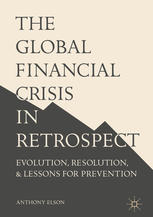

Most ebook files are in PDF format, so you can easily read them using various software such as Foxit Reader or directly on the Google Chrome browser.
Some ebook files are released by publishers in other formats such as .awz, .mobi, .epub, .fb2, etc. You may need to install specific software to read these formats on mobile/PC, such as Calibre.
Please read the tutorial at this link: https://ebookbell.com/faq
We offer FREE conversion to the popular formats you request; however, this may take some time. Therefore, right after payment, please email us, and we will try to provide the service as quickly as possible.
For some exceptional file formats or broken links (if any), please refrain from opening any disputes. Instead, email us first, and we will try to assist within a maximum of 6 hours.
EbookBell Team

4.3
68 reviewsThis book provides a uniquely comprehensive explanation of the 2008-2009 global financial crisis and resulting scholarly research in the context of building an agenda for reform. With the clarity provided by almost a decade of hindsight and a careful eye toward planning for prevention, Elson guides readers through both historical fact and scholarly interpretation, highlighting areas where careful critique of and changes in the international financial architecture and the mainstream macroeconomic paradigm can promote greater financial stability in the future. Given the great public concern over growing income and wealth inequality, the book examines their links to the increased financialization of the economy, both prior to and since the crisis. Finally, the book identifies a number of lessons that need to be recognized if adequate and effective reforms are to be introduced to avoid a financial crisis of similar magnitude in the future.
Comprehensive enough for university students and sufficiently innovative for financial policymakers, this book will appeal to a wide range of readers interested in understanding not just where the crisis has brought us, but what key economists have said about it and how we can strengthen our financial system oversight to deal with the continuing challenges of globalization.